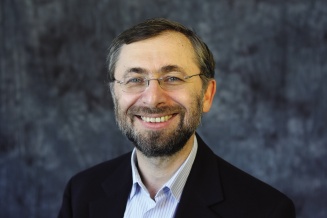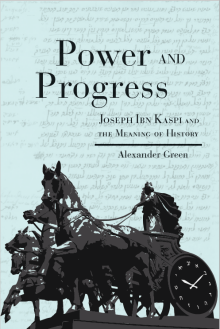Faculty Events

An interview with our inaugural Irving M. and Marilyn C. Shuman visiting assistant professor in Jewish Studies, Alexandra Zirkle
Tell us about your research:
My scholarship explores how German Jews turned to the interpretation of scripture as a way of navigating an era of tremendous change. Over the course of the nineteenth century, the German lands were convulsed by wars, religious strife, economic calamities, and political revolutions; amidst these broader changes, German Jews faced the collapse of the traditional Jewish communal structure (kehilla) and were figuring out new structures of communal authority and new models of education—all while also fighting for civil emancipation. Several generations of scholars have suggested that this period of transformation and acculturation was marked by the waning of Jewish religious life, but the story is actually much more interesting: in the midst of these overwhelming shifts, religious texts emerged as a vibrant space where German Jews worked out what it meant to be modern Jews and modern Germans. In Bible commentaries, sermons, prayerbooks (siddurim), and catechisms, German Jews used the interpretation of scripture to address a wide range of pressing contemporary concerns, including what forms modern Judaism should take, which professions Jews should practice, and how Jews should think about gender and sexuality.
My book, Biblical Interpretation and the Shaping of Modern German Judaism, illustrates how three of the most influential biblical commentators of the nineteenth century, Salomon Herxheimer (1801-1884), Ludwig Philippson (1811-1889), and Heinrich Graetz (1817-1891), reimagined German Judaism through their interpretations of biblical passages about the Jerusalem Temple and the sacrificial service. Although the Temple and sacrifice might seem like odd or antiquated topics to focus on, these institutions were actually at the center of heated debates amongst Jews and other Germans about whether ritual could be a meaningful element of religious life, about the nature of historical progress, and about the contributions of Judaism to European culture. These scholarly debates had real political consequences: theologians and politicians cited German Jews’ orientation toward the Jerusalem Temple as shibboleths for whether German Jews deserved civil rights. Biblical Interpretation and the Shaping of Modern German Judaism traces how the different interpretive methods used by Philippson, Herxheimer, and Graetz gave rise to four distinct theologies of the Temple, each of which was calibrated to engage contemporary scholarship and politics in ways that established the vitality of modern Judaism and defended German Jews’ claims to political emancipation.
What does it mean for biblical interpretation to be “political”?
The political ramifications of biblical interpretation are particularly obvious in the case of nineteenth-century German Jews: Protestant and Jewish scholars regularly cited interpretations of the Bible in their arguments for or against the civil emancipation of German Jews. As one example, from the late eighteenth century through the mid-nineteenth century, theologians and politicians proposed a quid pro quo arrangement which required German Jews to alter their professional occupations: Jews could be extended civil rights if they eschewed trade and moneylending and instead retrained as farmers and craftsmen. But Anton Theodor Hartmann, professor of Theology at the University of Rostock, published a series of articles arguing against extending Jews civil rights. Hartmann cited various biblical passages as evidence that Jews held an inherent aversion to physical labor and an innate predilection for trade and moneylending, and thus argued that no amount of professional restructuring would render German Jews fit for citizenship. The debate over Jewish emancipation turned on how one interpreted seemingly insignificant biblical passages; in this case, scholars and politicians often grounded their arguments on their disparate interpretations of Proverbs 28:19, He that tilleth his ground shall have plenty of bread; but he that followeth after vain things shall have poverty enough. German Jews entered the fray with their own exegetical interventions. Some German Jews redefined the terms of the debate, and some offered counter-narrative interpretations. Among the latter, Herxheimer interpreted these verses to argue that Jews have always been farmers and craftsmen and, when freed from exclusion from guilds and permitted to purchase land, they would flourish as farmers in German lands as well, thereby evincing the moral rectitude and attachment to the land befitting members of the German Volk.

Professor Richard Cohen
Professor Richard Cohen directed the 5th and 6th annual weeklong Levinas Philosophy Summer Seminar: the first was held from July 2-6, 2018, on the topic “Justice and Ideology,” at the University of Chicago Center in Paris, France; and the second, from July 15-19, on “Irresponsibility and Justice,” was held at the Center for Jewish History in New York City. He is currently working on three books. One co-authored by Professors Tito Marci and Luca Scuccimarra of the University of Rome, Italy, is tentatively titled Politics of Humanity. Another co-authored with Professor Algis Mickunis, Emeritus, Ohio University, is tentatively titled Religion, Heidegger and Levinas. The third book is on modern politics, takingup the topics of contemporary democracy and fascism and the relation of politics and ethics. Professor Cohen also translated the English portion of a tri-lingual book (French, German, English) of an interview by Francoise Armengaud with Emmanuel Levinas on art, titled On Obliteration (Berlin: Diaphanes Verlag, 2019), edited by Johannes Bennke. He also co-edited a special issue of the online reviewed journal
“Religion” (Basel, Switzerland, 2019), Volume 9-10, on the topic of “Levinas and the Political,” which included a new article by Professor Cohen titled “The Power of Carl Schmitt: Fascism, Dualism and Justice” which he had delivered as an invited Keynote Address at the 13th annual conference of the North American Levinas Society held at Western Carolina University at the end of May, 2018. Professor Cohen also delivered an invited Keynote Address, titled “Community of the Good or the Failure of Theodicy (Judges 19-21),” at the 16th Annual Psychology for the Other Conference held at Seattle University, November, 2018. On May 10, 2019, Professor Cohen delivered another invited Keynote Address, titled “Phenomenology, Humanity, Politics,” at an international conference on “Phenomenology and Politics,” sponsored by the Chinese University of Hong Kong, in Hong Kong, China. He also contributed an article on “Emmanuel Levinas” which is included in the Bloomsbury Handbook of Literary and Cultural Theory (London, England, 2018), edited by Jeffrey R. DiLeo. He has completed two additional articles which are forthcoming in 2019: “Judaism and Christianity’s ‘Judaism’,” in Evangelization as Interreligious Dialogue (Eugene, Oregon: Wipf and Stock) edited by John C. Cavadini and Donald Wallenfang; and a chapter titled “Levinas’s Post-Theological Ethics,” to be included in the Cambridge Companion to Jewish Thought (Cambridge: Cambridge University Press), edited by Steven Kepnes. In the upcoming year Professor Cohen hopes to continue working on his books and articles, and looks forward to teaching his undergraduate and graduate courses on political thought.
We are happy to announce that the National Endowment for the Humanities has awarded Professor Richard A. Cohen a grant to direct a one-week seminar to be held in Augusts 2020 on the topic “Emmanuel Levinas: Ethics of Democracy,” at the University at Buffalo.

Professor Sergey Dolgopolski
Following his last book, Other Others: The Political After the Talmud (Fordham University Press, 2018) Professor Dolgopolski is currently finishing the first draft of his new book project. Tentatively titled “The Political Philology of the Palestinian Talmud,” the project offers a critical exploration of the notion of possibility and im-possiblity of a new testament, in archives of Rabbinic rhetorical schools in late antiquity, also known as Palestinian Talmud. Dolgopolski presented parts of this project in papers “Reading Closely, Reading Distantly, Reading Slowly. Three Approaches to “Giving” the Law in PT Megilla” at the Association of Jewish Studies conference in Boston, December 2018; “Is Talmud Theory? Reading Slowly or the Fate of Rabbinic Citation” at the 11th European Association of Jewish Studies Congress (EAJS) Krakow, Poland. July2018; and “Theo-Earth and Geo-Midrash: A Jew, A Goy, and the Earth as a Task of International Law” at the Jewish Law Association
Association conference in Nurnberg and Fürth, Germany in August 2018. In October 2018, Dolgopolski has also co-organized a conference on “Relativity and Devotion in Jewish Studies: Text and Context” at the NYC Center for Jewish History, and is currently
co-editing a volume with the same working title. Planned for Indiana University press, Prof. Dolgopolski is also coediting a collective monograph on the relationships between Talmud and Philosophyas disciplines of thinking. In 2019, he delivers further parts of his new book project in papers “Ground without Place? Basic Legislative Topoi in the Palestinian Talmud Today.” A Conference on “Basic Concepts in Jewish Thought” Hebrew University of Jerusalem and Saint-Petersburg University, Saint-Petersburg, May 2019; and “Displaced and Redone: Are the Rabbis in the Palestinian Talmud Marranos?” at “The Marrano Phenomenon: Jewish ‘Hidden Tradition’ and Modernity” an International Conference at the Institute of Philosophy and Sociology Polish Academy of Sciences 17th-18th September 2019, Warsaw, Poland. Professor Dolgopolski have also given invited public lectures on the topics of his research in Poland and Latvia in 2018. Ending his three years term as Chair of the Department of Jewish Thought Professor Dolgopolski is planning to spend his Sabbatical in the
Spring 2020 to advance the book project
and to prepare the manuscript for submission to press.

Professor Alex Green
Professor Alex Green’s first book, The Virtue Ethics of Levi Gersonides (Palgrave Macmillan 2016), has been reviewed in two academic journals in 2018: Journal of the History of Philosophy and Interpretation. The paperback edition of the book was released in January 2019. His second book, Power and Progress: Joseph Ibn Kaspi and the Meaning of History, is forthcoming with SUNY Press in September 2019. He is working on two collaborative book projects: Jewish Virtue Ethics (SUNY Press) with Geoffrey Claussen and Alan Mittleman and his translation of Gersonides Lessons (Toalot)
on Genesis with David Horwitz. He has two articles forthcomingin edited collections: “Three Readings of Averroes’ Commentary on Plato’s Republic in Medieval Jewish Thought,” in Plato Across Civilizations: Novel Perspectives on Averroes’ Commentary on Plato’s Republic; (University of Rochester Press) and “Gersonides and Ibn Kaspi on the Uncertainty of the Future and the Practical Intellect,” in Scepticism and Anti-Scepticism in Jewish Averrorism, (De Gruyter). Green participated in three conferences this year. First, he traveled to Hamburg, Germany to speak at the conference Scepticism and Anti-Scepticism in Jewish Averroism at the Maimonides Centre for Advanced Studies at the University of Hamburg.Second, he organized a panel on the thought of David Novak at the Association for Jewish Studies in Boston in December 2018 and gave a paper on that panel on “Novak and Medieval Jewish Philosophy.” Third, he participated in a symposium on the first English translation of Hasdai Crescas’ Or Hashem (Oxford University Press, 2018) by Roslyn Weiss at Lehigh University in Bethlehem, Pennsylvania.
Upcoming Book Release

Power and Progress: Joseph Ibn Kaspi and the Meaning of History, set to be released September 2019“This book is the first book in English to focus on a central aspect of Joseph Ibn Kaspi’s work: his philosophy of history. Alexander Green argues that Ibn Kaspi understood historyas guided by two distinct but interdependent forces: power and progress, both of which he saw manifest in the biblical narrative. Green reveals Ibn Kaspi to be more than a mere commentator on texts, but a highly innovative thinker whose insights into the subtleties of the Bible produced a view of history that is both groundbreaking and original.”